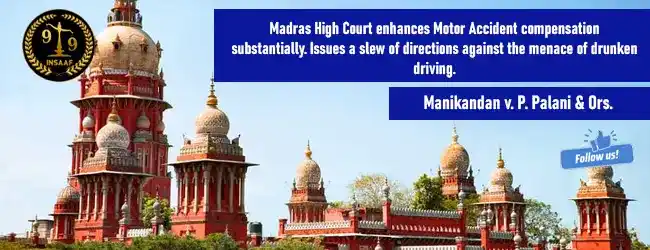2023-Nov-24

The Madras High Court has enhanced compensation to a motor accident victim n from Rs.4,37,920/- to Rs.67,35,000/- along with interest at the rate of 7.5% per annum. The appeal had been preferred by the claimant aggrieved with the quantum of compensation of Rs.4,37,920/- towards disability sustained by him due to the injuries caused to him in the accident which occurred on 01.02.2013, when a lorry belonging to the 1st Respondent, the Driver, insured with the 2nd Respondent, the insurance company driven by its driver rashly and negligently, hit against the car resulting in the victim sustaining grievous injuries.
The claim petition was contested by the 2nd Respondent/Insurance Company and the Tribunal on appreciation of evidence found that the accident occurred because of the rash and negligent driving of the lorry insured with the 2nd respondent and determined the disability at 33%. It applied the multiplier method by taking Rs.6,000/- as monthly income and “17” as multiplier and along with other heads, awarded a sum of Rs.4,37,920/- as compensation. Questioning the adequacy of the compensation only, the claimant filed an appeal before the High Court.
The counsel for the appellant submitted that the appellant sustained serious injuries and it was proved before the tribunal that he has become a vegetable and he is unable to do any work and he has become mentally retarded due to brain injury. Therefore, 100% disability should have been determined by the Tribunal, so also loss of 100% earning power. Moreover the amounts awarded under other heads were all very low. However, the counsel appearing for the Insurance Company submitted that the appellant was in a fit condition, when he was examined before the trial Court and therefore, the Tribunal rightly determined disability at 33% which needed no interference.
The High Court on appreciation of the facts, circumstances and based on the trial court records held the driver of the lorry alone as liable for negligence, however attributed 10% as contributory negligence in view of smelling of alcohol as proved by the discharge summary. As far as the validity of license was concerned the High Court held that light motor vehicles included transport vehicles also and a holder of light motor vehicle licence could drive all the vehicles including transport vehicles. As far as notional income was concerned the High Court considering the nature of work, fixed a sum of Rs.15,000/- as notional income of the claimant/driver who sustained injuries in the accident occurred during the year 2013. Also as per e Constitution Bench's judgment of the Honourable Apex Court in National Insurance Company Limited V. Pranay Sethi and others, reported in 2017 (2) TN MAC 609 (SC), another 40% was added towards future prospects. Therefore, the monthly income came to Rs.21,000/- [Rs.15,000/- (+) 40% of Rs.15,000/- viz., Rs.6,000/-]. As per the judgment of the Honourable Supreme Court in Sarla Verma & Others .Vs. Delhi Transport Corporation & another, reported in 2009 (2) TNMAC 1 (SC) based on the age of the claimant, a multiplier of “17” was applied. Therefore, loss of earning was calculated at Rs.42, 84,000/- (Rs.21, 000/- x 12 x 17). As far as attendant charges were concerned the High Court enhanced it from Rs.2000/- to RS.6000/- per month. For pain and suffering the Court enhanced the sum from Rs.10000 to Rs.250000/-, transportation charges from Rs.5000/- to Rs.50000/-, Extra Nourishment from Rs.5000/- to Rs.100000/- . Rs.300000/- was awarded towards loss of amenities, Rs.200000/- towards future medical expenses, and on account of loss of marital bliss to wife of the claimant an amount of Rs.500000/- was awarded.
Court issues the following directions:
1. The Respondents police authorities shall arrest the drunken drivers under Section 202 of the Motor Vehicles Act and subject the drivers for Breathalyser Test under Section 203 of the Motor Vehicles Act for alcohol detection as per Section 185 of the Motor Vehicles Act. .
2. The respondents shall make available the sufficient number of Breathalysers to the police.
3. The police authorities shall invoke Section 279 of the IPC for the offence of drunken driving in addition to Section 185 of Motor Vehicles Act.
4. The State transport authorities shall revoke the licence under Section 19(1) (f) of the Motor Vehicles Act for drunken driving.
5. The State transport authorities shall invoke Rule 21(16) of the Central Motor Vehicles Rules, 1989 to disqualify the drunken drivers from holding a driving licence.
6. The respondents shall seize/take custody of vehicles of drunk drivers as per Section 202(3) of Motor Vehicles Act.
7. The respondents shall constitute special committed units/wings to check drunken driving.
8. The respondents shall invoke Section 185 of the Motor Vehicles Act along with other IPC offences in cases of accidents involving drunken driving.
9. The Central Government shall consider the suggestion to direct the automobile manufacturers to install "Alcohol Sensing Ignition Interlocking Devices".
10. The respondents shall conduct mass media campaigns against drunk driving regularly roping in celebrities like political leaders, cine stars, sports persons etc., including sensitisation of people, especially college students through short films, dramas and pamphlets about the dangerous consequences of drunk driving.
Manikandan v. P. Palani & Ors.
What can the Legal Experts do for you? Our team of lawyers is ready to help you in minutes with any legal question.
 Whatsapp
Whatsapp
 Toll Free :-
1800-212-9001
Toll Free :-
1800-212-9001